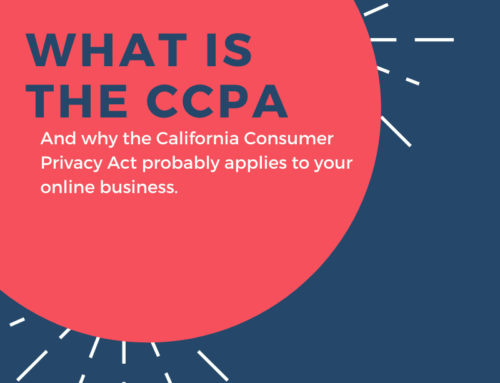![]()
On December 1, 2009, the Federal Trade Commission (FTC) updated their rules regarding advertising disclosures. It was the first time that the rules specifically brought bloggers under the FTC rules and guidelines. And the blogging world, since then, has been trying to figure out what to do.
The FTC provisions are set out in 16 CFR Part 255. That’s fancy talk for the Code of Federal Regulations, which is where Federal rules and codes are made public. It’s a lengthy legalese-filed document, crafted by a team of very knowledgeable and capable attorneys and regulators. But it’s not in plain English and has left a great deal of room for interpretation.
The FTC rules pertaining to bloggers are not specific. There is no numbered list telling bloggers exactly how to comply with the new rules. And that has created a wide range of responses by bloggers from many different niches. Some are up-front and suggest overt and clearly placed disclosures. Others believe that they put it on a ‘Disclosure Policy’ page and that it’s up to the reader to read it.
While the FTC does not provide a clear set of what a blogger can and can not do, it is very clear in the guidelines that all disclosures must be “clear and conspicuous“. You’re thinking, that sounds very legalese so what does that mean in English?
For several decades, the FTC didn’t concern itself with bloggers. However, it was due to a rise in complaints by consumers regarding what they deemed to be unethical practices that caused the FTC to step in. Our government is very paternalistic. Bloggers on their own were not able to standardize the practice of disclosure so the FTC stepped in and basically said ‘If you’re not going to do it, we’ll do it for you.’ It became increasingly difficult to determine what was or was not an advertisement or endorsement, so the guidelines are trying to set up a paradigm where it’s clear what the relationship is between the parties.
Will the FTC come after bloggers for non-disclosure? What does it mean to comply with FTC disclosure guidelines? Why do I have to do it if Other Blogger isn’t doing it?
Will the FTC come after bloggers for non-disclosure?
The short answer is No. The longer answer is ‘it depends’. The FTC is a large organization that polices millions of advertising and media (both new and ‘main stream’) impressions daily. With over 150 million blogs worldwide (Source: Blogpulse), and hundreds of thousands of companies advertising in the US, that’s a lot of data for the FTC to keep tabs on. Which means that, on a daily basis, they are not trolling the internet reading blog posts to determine if any one blogger in particular is telling their readers they received a product for free or that the links are affiliate links.
However, and of course there is always a however, if your readers feel they are being mislead or that you’re not being forthright with your links there is nothing to stop them from reporting you to the FTC. And a few complaints for the same blog will likely pique interest. In addition, if you’re participating in brand or PR driven promotions that are generating a lot of buzz, traffic or media the FTC may look into what types of disclosures are being made. In February, 2010 the FTC did take notice of an Ann Taylor campaign using bloggers. After investigation, the FTC gave Ann Taylor a one-time pass with regard to ‘blog disclosure’. But it only highlights that the FTC is not turning a blind eye to the relationship between bloggers and brands.
What does it mean to comply with FTC disclosure guidelines?
Complying with the FTC disclosure guidelines means telling people when you are advocating on behalf of a brand, product or service. It doesn’t mean disclosing what type of compensation or any aspects of your agreement. It’s simply about being up-front about why you’re mentioning a brand, product or service.
The FTC standard states that all disclosures need to be clear and conspicuous. What does this mean?
No one knows exactly what ‘clear and conspicuous’ means in terms of blogger disclosure. There have been many discussions on this topic by bloggers, ‘social media experts’, companies trying to get people to use their ‘disclosure compliance’ mechanism as well as PR agencies and brands. Ask 5 people and you’re likely to get 7 different answers. However, I think Mary Engle of the FTC says it best when she says the disclosure should be straightforward and up-front. You can see her short video below:
In conclusion, the FTC guidelines for Endorsements and Testimonials in Advertising are not some set of onerous rules designed to prevent bloggers from making money or creating authentic and genuine content. The FTC guidelines are a ways to level the playing field among those who receive compensation in exchange for their promoting a brand, service or product.
Just be up-front, clear and straightforward with your readers or viewers and you’ll be just fine. Don’t make your readers or viewers hunt around to determine what the relationship is. By burying it, making them click several links, taking them to a 3rd party compliance page or using cryptic descriptions you’re only setting yourself up for potential problems and not being forthright with your readers.
Remember that you, as a blogger, are much more invested in the workings of blog management. Not everyone who reads your site is a blogger. And, basically, wouldn’t you want to know if the review, endorsement, ‘shout out’ or what have you is genuinely their own or if they’re being paid to say something? The average reader likely does not assume that you’re being compensated to talk about things on your blog.
There is nothing wrong with being compensated to endorse, promote, advertise or share information about a brand, service or product. If you’re forthright and honest with your readers and viewers, they’re more likely to continue the relationship.
Yes, it’s true that different types of sites may require different types or means of disclosure. Nonetheless, if you have a relationship, disclose it. In addition, there may be times when you’ll want to disclose that you do not have a relationship. Don’t hesitate to say so. Remember, honesty is always the best policy when it comes to FTC disclosures.
What are your thoughts about the FTC disclosure rules? Are you confused about what you have to do? Has the FTC gone too far? Are you mad because you disclose and others don’t?
Note: In 2013, the FTC updated the decades-old Dot Com Disclosure guide. To learn more about how this update may impact your business or online work, check out FTC Dot Com Disclosure updates and what they mean for bloggers, brands, influencers, content creators, online professionals, and entrepreneurs.
Disclosure: While I am a lawyer, I am not offering legal advice. Posts on legal matters are intended to provide legal information and do not create an attorney/client relationship.






i always write out my disclosure in the blog post where i have something to disclose. i see a lot of people making a little affiliate icon and putting it in with their social media icons and i don’t think that cuts it because it doesn’t necessarily show up in their rss feed and most non-bloggers would never think to look at it or know what it means so i think typing it out in plain english text as part of the post is the way to go.
Carrie, you’re right to put your disclosures in written form within the post somewhere. I’ve seen the icons of you mentioned and while they’re cute and I think may be helpful after the learning curve, they’re not taking into account that the average blog reader is not going to know what they mean. And, in my opinion, I don’t think the reader should have to hunt around to find out what an icon like that means. I just takes away from why they are there, which is to read quality content.
I’m in the process of redoing my site design and including a “Disclosure Policy” text link at the bottom of each post, instead of the icon I’m currently using.
However, I would argue that putting a phrase like “This post may contain affiliate links” is no more helpful or clear than an “A” icon meant to signify an affiliate link. Most blog readers don’t know what an affiliate link is, and so the words “affiliate link” mean no more to them than a fancy symbol with an “A” on it.
Carrie,
You’re right that most blog readers don’t know what an affiliate link means. I try to tell them what that means, as part of a best practices program. However, there is no clear standard. I’ve been to your site and I’ve see the ‘A’ icon, but then again I have an idea of what I’m looking at. Again, if there was some standard it would make it easier for all of us – both bloggers and readers.
Unfortunately, there is no way to know what exactly each reader’s knowledge level is when they are at your site. In addition, I think there is a concern that if we, as bloggers, say we’re getting paid or potentially getting paid (even if it is pennies) when a reader clicks on something that is something negative. Disclosure gets tricky when you may not get paid unless the link is clicked and the person now signs up or downloads or buys something. It’s not as easy as saying we’ll get compensation because even that word ‘compensation’ means different things to different people.
I appreciate that a room of regulators and lawyers came up with these FTC disclosure guidelines, but it’s frustrating to me as a lawyer (and blogger) because there seemed to be a major component missing in that the group did not appear to include comment or input from anyone who would put these guidelines into action.
Probably my favorite disclosure comes from John Chow who is very up-front and basically says that anything on his site will bring him money in some form and if it doesn’t then that’s an oversight on his part.
As always, thank you for your input. You have a unique perspective because of your blog niche and I truly appreciate you sharing how this works not only within your niche but in the actual logistics of blog management. Especially when you put up 30+ posts a day.
Kindest Regards,
Sara
i am so frustrated, does anyone have an FTC disclosure i can put on my website????
Joe, the FTC does not publish a standard disclosure. There are websites that purport to provide ‘stock’ disclosures. It’s probably best to either seek legal counsel to assist you in crafting a policy that is specific to your website and discuss FTC compliant disclosures for specific posts or shares.
Excellent article!!!!!!! Excellent. RTing now!
Best,
Li
@LaLicenciada
The FTC rule regarding disclosure can’t be written any clearer than this. While I agree with Carrie regarding the cuteness of the little (A), it doesn’t do the job of disclosing the fact that you may have been compensated in some form or fashion. In the comment love post that shows up below, you can see the disclosure statement that I use. It is not placed on every singles post because not every post has affiliate links. While some bloggers may know what the (A) or any other image in the post footer means, I don’t believe that is the case for most blog readers.
I wish more people (bloggers and advertisers) would read this. I’ve been receiving offers for paid posts but stating they require that I don’t disclose it is paid.
I turn them down – which is money loss for me, but not a loss of ethics or honesty. If I’m getting paid or receiving a product – I’m disclosing that.
Darcy,
It’s very sad that professionals feel that can’t be honest and forthright about having been paid for their time and experience. If I was the brand and I found out that my agents were telling people not to disclosure I would be livid! The brand has a lot to lose, both monetarily and reputation. Also, if you’re tied to a situation where there was no disclosure you could face penalties.
Bottom line is that there should be nothing shameful about being paid to do a job.
Thank you for visiting my blog and sharing your experience.
~ Sara
Sara,
When I was looking something up recently, I ran across a page where the FTC answered questions from bloggers that they’d been receiving. It was pretty interesting. It even mentions situations in which you may need to disclose getting a $1 off coupon from the company and says buttons aren’t sufficient, though it’s talking about buttons reading “Disclosure”, not buttons with a simple “A”. I assume it would apply though.
http://business.ftc.gov/documents/bus71-ftcs-revised-endorsement-guideswhat-people-are-asking
[…] in the over disclose camp. If you’re a blogger, how do you disclose? Blog Law – FTC Disclosures and You @Saving for […]
[…] FTC Disclosures & You ( a MUST read) […]
[…] are essential to every blogger’s success. FTC disclosure rules for bloggers are easy to comply with, if you’re willing to trust that your readers want you to be […]
I have a Privacy page with plain and simple language on how my blog doesn’t rent or sell or use email addresses with 3rd parties. This new FTC guidelines makes me think I need to add additional language that openly addresses if/when an affiliate link is included in a blog post that I will be compensated if they buy that product. My site only gets 1,000 visitors a week, so I doubt the FTC is concerned about my site, but playing by the rules seems to be more important these days.
[…] are essential to every blogger’s success. FTC disclosure rules for bloggers are easy to comply with, if you’re willing to trust that your readers want you to be […]
[…] FTC Disclosure and You for more […]
[…] The Endorsement guides offered little, if any, insight. Now, the FTC has specifically addressed disclosure in blog posts. Disclosures have always had to be clear and conspicuous, however, the FTC is now saying that if […]
[…] FTC Disclosures & You ( a MUST read) […]
[…] NOTE: When writing sponsored blog posts it’s important to stay on the right side of the FTC. You can find more information about it here: Blog Law – FTC Disclosures and You […]